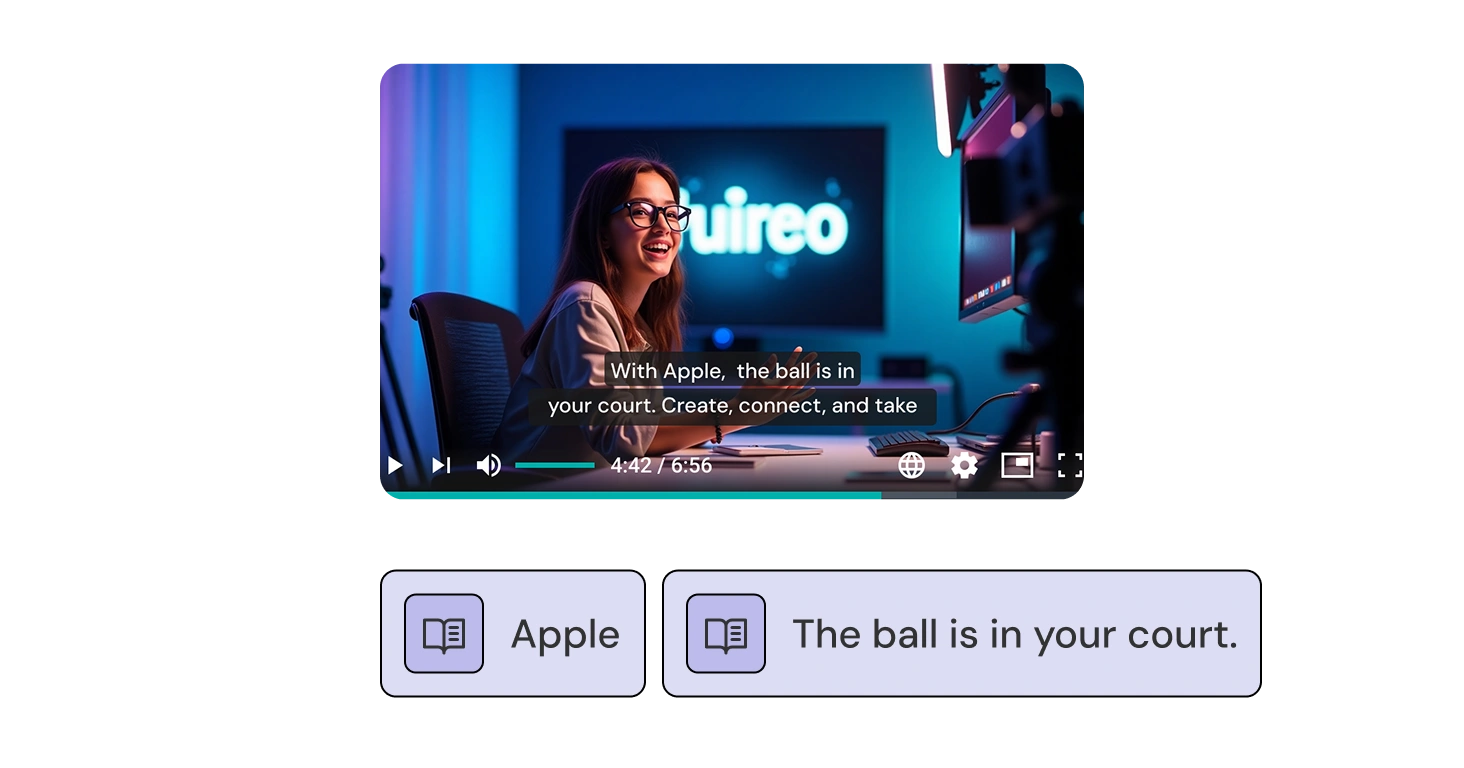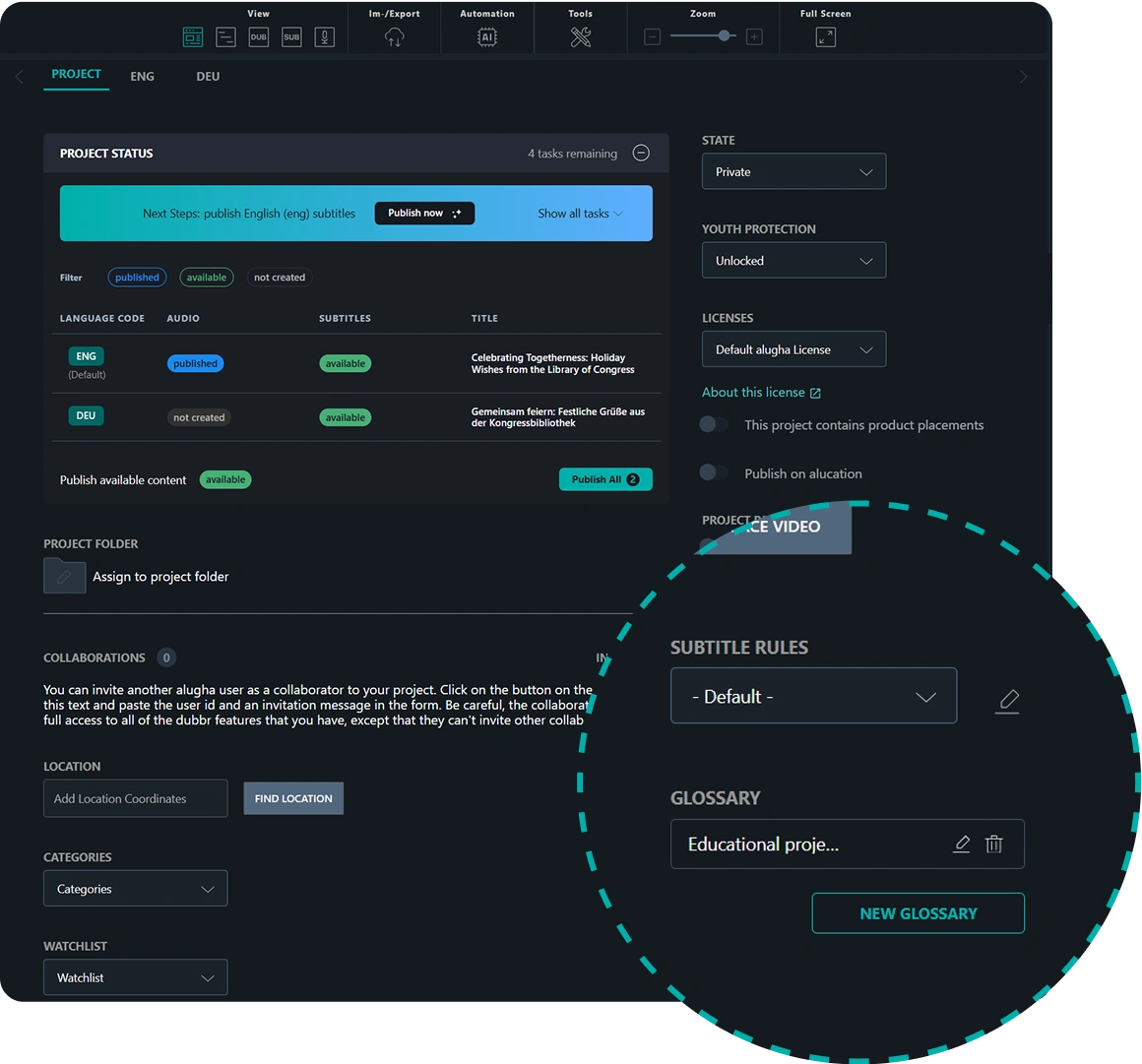Protect Your Brand with the alugha Glossary
Take control of your message with the alugha glossary and ensure brand names, product jargon, and technical terms are never mistranslated again.


ENSURE ACCURATE and BRAND-SAFE TRANSLATIONS
Go beyond standard AI translation and define your key terminology, eliminate errors, and ensure your message is always precise, in every language.
Consistent and accurate
Keep brand names, products, and industry terms precise and consistent in every market.
Automated efficiency
Automate the repetitive tasks. Once your glossary is set, the AI ensures every video stays consistent—whether it’s one project or hundreds.

3X
speed up the translation process
Activate glossary in the project
Scalable by design
Use your glossary across your entire video library in one click.
Consistent and accurate
Keep brand names, products, and industry terms precise and consistent in every market.
Activate glossary in the project
Scalable by design
Use your glossary across your entire video library in one click.
ALUGHA glossary
make every word count
From brand names to industry jargon, the glossary helps you define how key terms are translated so your message is always on point.
Brand names and products
Keep trademarks, product names, and company terms consistent worldwide (e.g., Apple stays Apple, never translated).
Abbreviations and acronyms
Define if acronyms (e.g., EU, GDPR, HR) should be retained, expanded, or localized.
Industry jargon
Ensure technical terminology (medical, legal, financial, etc.) is translated with precision and consistency.
Cultural sensitivity
Adapt terms to local norms and define culturally appropriate alternatives to avoid missteps.
Numbers, units and formats
Standardize dates, currencies, and measurements (e.g., miles → kilometers, 10,000 → 10.000).
Expressions and sayings
Translate idioms or common phrases by meaning, not word-for-word, to sound natural in each language.

TAKE FULL CONTROL OF YOUR MULTILINGUAL CONTENT
The alugha glossary is more than a feature—it’s your command center for global brand integrity. Here’s how it empowers you:

Maintain unbreakable brand consistency
Stop brand-damaging errors before they happen. Define your brand names, product titles, and slogans in a custom glossary. Our AI will protect them across every video and language, ensuring your brand voice is never lost in translation.
Custom term lists
Project-wide application
Case sensitivity
Guarantee pinpoint accuracy, globally
Ensure technical jargon and industry-specific terms are always correct. Our multi-language functionality protects your terminology across every language pair, giving you precise control over your global message.
Multilingual
Bidirectional support
Eliminate rework and boost efficiency
Stop wasting hours on manual corrections. With seamless AI integration, the glossary works automatically in your workflow. You can import existing terminology lists for instant setup, saving valuable time.
Seamless AI integration
Import functionality
Glossary set up
Video tutorial
SET UP YOUR CUSTOM GLOSSARY IN MINUTES
We believe powerful tools should be simple to use. This short walkthrough demonstrates how you can create, activate, and deploy your custom glossary in just a few clicks.
Glossary set up
Video tutorial
SET UP YOUR CUSTOM GLOSSARY IN MINUTES
We believe powerful tools should be simple to use. This short walkthrough demonstrates how you can create, activate, and deploy your custom glossary in just a few clicks.
Trusted by Industry Experts Worldwide
Leaders across industries trust alugha for seamless video translation, hosting, and global distribution.



“We no longer need a translation studio for our videos. This not only saves us time, but also reduces costs, while maintaining the same quality of translation”.

Till Sudworth
Chief Marketing Officer at NPAW
“The speed and professionalism is really impressive. One always imagines that everything is extremely complicated, but alugha toolkit makes it very easy”.

Stefan Nikolaus
Director HR Europe at Cohu Inc.
“alugha revolutionized our video localization with unique multilingual audio tracks and practical tools, saving us significant time and effort”.

Paul Parry
Senior eLearning and Video Specialist at Trimble
Trusted by Industry Experts Worldwide
Leaders across industries trust alugha for seamless video translation, hosting, and global distribution.



“We no longer need a translation studio for our videos. This not only saves us time, but also reduces costs, while maintaining the same quality of translation”.

Till Sudworth
Chief Marketing Officer at NPAW
“The speed and professionalism is really impressive. One always imagines that everything is extremely complicated, but alugha toolkit makes it very easy”.

Stefan Nikolaus
Director HR Europe at Cohu Inc.
“alugha revolutionized our video localization with unique multilingual audio tracks and practical tools, saving us significant time and effort”.

Paul Parry
Senior eLearning and Video Specialist at Trimble
ALUGHA glossary
Take control of every translation
Included in the Enterprise plan. Available as an add-on for other paid plans.
Ensure your brand, products, and terminology are always translated with precision. The alugha glossary gives you the consistency and accuracy standard AI can’t guarantee — protecting your voice in every market.

ALUGHA glossary
Take control of every translation

Included in the Enterprise plan. Available as an add-on for other paid plans.
Ensure your brand, products, and terminology are always translated with precision. The alugha glossary gives you the consistency and accuracy standard AI can’t guarantee — protecting your voice in every market.
FAQ
Got questions? Check out these common ones, or send us a message — we’re happy to help!
Is the glossary feature included in my plan?
The glossary is a powerful addon feature designed for users who require the highest level of brand control and translation accuracy. It can be added to your existing plan. Please reach out to our sales team, and they will be happy to help you get started.
What kind of terms are best for a glossary?
The glossary is most powerful when used to protect your unique and critical terminology. This includes brand & product names (e.g., alugha dubbr, iPhone), technical jargon (e.g., SaaS, API), company-specific acronyms, and any other word that must remain consistent in every language.
Can I use one glossary across multiple video projects?
Yes, absolutely. We designed it for scalability. You can create a master glossary for your brand and activate it for any new or existing project with a single click. This ensures effortless consistency across your entire video library.
How is this different from a simple find-and-replace?
Unlike a manual find-and-replace, the glossary is an intelligent, automated part of the translation workflow. It applies your rules before the AI translates, preventing errors from ever being made. It’s proactive, not reactive, saving you the tedious work of hunting for mistakes.
Can I import an existing list of terms?
Yes. To make your setup as efficient as possible, you can directly import existing terminology lists into the alugha glossary. This allows you to get started in minutes and immediately apply your established brand voice to your video projects.